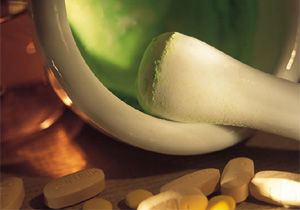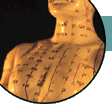Spleen
The spleen is located in the middle jiao
(abdominal cavity). Its main physiological functions
and indicators are:
(1) governing transportation and transformation;
(2) controlling blood;
(3) dominating the muscles and four limbs;
(4) opening into the mouth, and lip complexion.
The spleen has an exterior and interior relationship
with the stomach.
Governing Transportation and Transformation
This function includes the transportation and transformation
of water, and of essential nutrients.
If the spleen's transportation and transformation functions
are sound then the functions of digestion, absorption and
transportation will work normally. Otherwise, abdominal
distention, diarrhea, lassitude, emaciation, malnutrition,
and other symptoms may occur.
The spleen is also involved in water metabolism.
When the spleen transports nutrient substances, it simultaneously
distributes water to every tissue of the body
carrying out its functions of nourishment and moistening.
From the spleen, water is also sent down to the kidney
and excreted from the urinary bladder. The whole process
of distribution and metabolism of water is jointly
accomplished by the lung's dispersing and descending
functions and the spleen's transportation and transformation
functions. If the spleen fails to transport and transform
the water it will lead to various pathological changes.
If water accumulates inside the body, it will turn into an
inflammatory mucus (phlegm-humor); if it is retained in the
skin and muscle, it becomes a swelling (edema); if the water
retention is in the intestines, it will cause diarrhea; if it
is in the abdominal cavity, it will result in serious fluid
accumulation (ascites). In the Suwen it says, "...various kinds
of diseases caused by dampness with swelling and fullness
belong to the spleen."
Since the functions of transportation and transformation
of essential nutrients as well as water are interrelated,
their pathological manifestations often accompany each other.
Controlling Blood
The spleen regulates blood circulation inside the
blood vessels. If there is a qi deficiency in the spleen,
then its function of controlling the blood is lost and the
blood flows outside of the vessels. This is evidenced by
various hemorrhagic symptoms and diseases, such as chronic
uterine bleeding.
In order to control the blood, the spleen uses ying
(nutrient) qi, a form of blood qi, which it produces. Qi
behaves as the "commander" of the blood and, at the same time,
conserves the blood. Therefore the hemorrhagic symptoms and
diseases caused by the failure of spleen controlling blood
are actually the results of qi failing to conserve blood.
Dominating the Muscles and Four Limbs
The spleen transports and transforms nutrient substances to
nourish the muscles. If this function is normal, there
will be sufficient nutrition. Any abnormality of transportation
and transformation will certainly affect muscle tissue quality.
The Suwen records, "The spleen is in charge of the muscles."
The normal movements and functions of the four limbs
are also closely related to spleen qi. When there is
sufficient spleen qi, the yang qi distributes ample nutrient
substances all over the body so that the muscles are well
nourished and the four limbs are strong and able to move freely,
Otherwise if the spleen fails to transport and transform the
yang qi and nutrient substances, there will be malnutrition of
the muscles characterized by muscular atrophy, weakness of
the four limbs, etc. Therefore, building up the spleen is
the usual clinical treatment for wei syndromes of the four limbs.
Opening into the Mouth and Lip Complexion
The appetite and sense of taste are closely related
to the transportation and transformation functions of
the spleen. If these functions are healthy, then there will
be good appetite and normal sense of taste. If those
functions are abnormal, there will be a lack of appetite.
A greasy and sweet taste in the mouth is caused by damp
obstruction in the spleen. In the Suwen it says, "Spleen qi
is in communication with the mouth, and when the spleen
functions harmoniously, the mouth will be able to taste
the flavors of the five cereals."
Since the spleen dominates the muscles and opens
into the mouth, the strength or weakness of the transporting
and transforming functions are reflected in the lips. If the
spleen qi is not healthy, those functions will be abnormal, a
condition which is characterized by yellowish and lusterless lips.
Related Subjects
Read more on other Zang Organs: Heart,
Lung,
Liver, and
Kidney.
| 
 This website is published, edited and designed by Raymond Cheng,
and reflects only and only his personal views and opinions in his individual capacity.
The information available at this website is not intended
directly or by implication to either diagnose or treat any
medical, emotional, or psychological condition or disorder.
It is also not intended to create a physician-patient relationship
between you and I or between you and Wyith Institute™ and The Office of Dr Raymond K K Cheng.
The information here is not a substitute for advice and treatment provided
by your physician or by another healthcare professional.
It is always recommended that consultation with local healthcare providers
be obtained for any of your specific health or medical concerns.
Furthermore, any products that can be purchased (yet you can see I don't have much
to sell here) through advertisers' banners or through links to other websites
are not either explicitly or implicitly given any warranty or endorsement
by me, my colleagues, Wyith Institute™ or any of its associated businesses.
This website is published, edited and designed by Raymond Cheng,
and reflects only and only his personal views and opinions in his individual capacity.
The information available at this website is not intended
directly or by implication to either diagnose or treat any
medical, emotional, or psychological condition or disorder.
It is also not intended to create a physician-patient relationship
between you and I or between you and Wyith Institute™ and The Office of Dr Raymond K K Cheng.
The information here is not a substitute for advice and treatment provided
by your physician or by another healthcare professional.
It is always recommended that consultation with local healthcare providers
be obtained for any of your specific health or medical concerns.
Furthermore, any products that can be purchased (yet you can see I don't have much
to sell here) through advertisers' banners or through links to other websites
are not either explicitly or implicitly given any warranty or endorsement
by me, my colleagues, Wyith Institute™ or any of its associated businesses.



 Thank you for visiting this TCM and acupuncture information website.
If you have previously been to this website, you might have
noticed that some of the pages on ancient historical ideas and
holistic thinkings related to Chinese metaphysics are temporarily taken offline.
This is because I will be revamping the whole website and be moving
those information into a new \"Ancient Chinese Culture\" section
so as to reflect a more current perspective on the interpretation
of some of the fundamental concepts as well as to include
some of the latest information in the area.
But if you have just found this website for the very first time, I welcome you again and
wish you could find what you require and, hopefully, you could also be benefitted
from reading the articles I published on this website.
Thank you for visiting this TCM and acupuncture information website.
If you have previously been to this website, you might have
noticed that some of the pages on ancient historical ideas and
holistic thinkings related to Chinese metaphysics are temporarily taken offline.
This is because I will be revamping the whole website and be moving
those information into a new \"Ancient Chinese Culture\" section
so as to reflect a more current perspective on the interpretation
of some of the fundamental concepts as well as to include
some of the latest information in the area.
But if you have just found this website for the very first time, I welcome you again and
wish you could find what you require and, hopefully, you could also be benefitted
from reading the articles I published on this website.